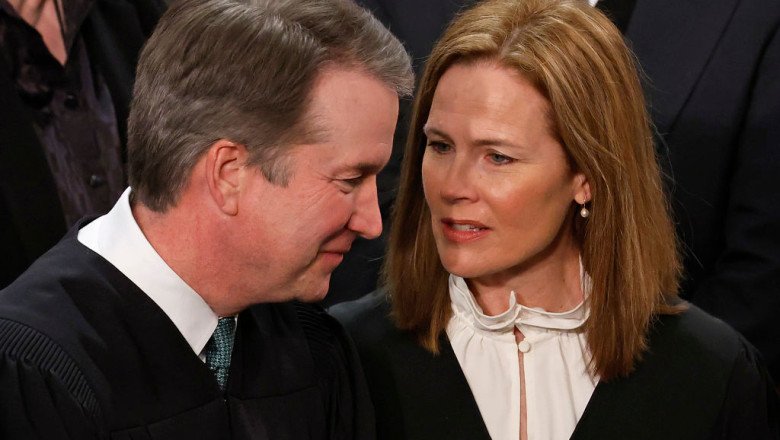
views
The Supreme Court on Friday handed President Donald Trump a major victory by limiting the ability of lower courts to block his executive order curbing birthright citizenship while sidestepping the core constitutional question at the heart of the controversy: whether the children of undocumented immigrants born on U.S. soil are entitled to citizenship under the 14th Amendment.
In a 6-to-3 decision split along ideological lines, the Court ruled that lower federal judges had overstepped their authority by imposing nationwide injunctions that blocked the policy across all 50 states. Writing for the majority, Justice Amy Coney Barrett criticized such sweeping judicial orders, stating, “When a court concludes that the executive branch has acted unlawfully, the answer is not for the court to exceed its power, too.”
Advertisement
Advertisement
The Justices did not address the legality of Trump’s effort to dismantle automatic citizenship for children born in the United States to noncitizen parents, leaving that question for future litigation. But their ruling weakens a key legal tool that had previously stalled the Administration’s immigration agenda—and may open the door to new, state-by-state battles over one of the most deeply rooted principles in American law. The order will not go into effect for 30 days, the Justices said in their opinion, allowing its legality to be contested further.
The decision means that, barring further legal action, Trump’s birthright citizenship order could soon take effect in 28 states that have not formally challenged it. However, it remains blocked in New Hampshire, where a separate case is still pending.
Trump celebrated the Supreme Court’s ruling on nationwide injunctions at a press briefing on Friday, calling it a “monumental victory for the Constitution, the separation of powers, and the rule of law.”
Advertisement
“This case is very important,” he said, referring to his executive order that could reshape the country’s immigration framework. “I was elected on a historic mandate, but in recent months, we've seen a handful of radical left judges effectively try to overrule the rightful powers of the President to stop the American people from getting the policies that they voted for in record numbers.”
Trump’s executive order, issued on his first day back in office, called for denying citizenship to the U.S.-born children of undocumented immigrants and temporary visitors, a dramatic departure from more than a century of legal interpretation. The order specified that only children with at least one U.S. citizen or lawful permanent resident parent would be considered citizens at birth.
Read more: How Does Birthright Citizenship in the U.S. Compare to the Rest of the World?
Critics argue that the policy directly contradicts the Citizenship Clause of the 14th Amendment, which states: “All persons born or naturalized in the United States, and subject to the jurisdiction thereof, are citizens.” The Supreme Court has previously upheld this clause as conferring citizenship to nearly all children born on American soil—a position most legal scholars consider settled law since the Court’s landmark 1898 ruling in United States v. Wong Kim Ark.
Advertisement
Legal challenges were filed within days of the executive order. Judges in Washington, Maryland, and Massachusetts swiftly issued preliminary injunctions blocking the policy nationwide. In Seattle, U.S. District Judge John C. Coughenour called the order “blatantly unconstitutional.”
But Friday’s ruling clipped the wings of such expansive judicial intervention. The majority opinion faulted the lower courts for applying their injunctions beyond the plaintiffs in the case.
The decision follows years of mounting frustration among Republican and Democratic administrations alike, as nationwide injunctions have increasingly been used to derail executive policies before higher courts could weigh in. For Trump, whose administration has aggressively tested the bounds of executive authority on issues from immigration to civil rights, such injunctions have posed frequent obstacles.
During oral arguments, Solicitor General John Sauer argued on behalf of the Trump Administration that nationwide injunctions are unconstitutional and that the lower counts should have only been able to block Trump’s order in relation to those who had filed lawsuits. He said only the Supreme Court could rule on the constitutionality of the executive order for the entire country, and that the Trump Administration has faced an especially high number of such rulings: federal judges have issued 40 nationwide injunctions since the start of Trump's second term, and that 35 have come from the same five judicial districts.
Advertisement
The Justices appeared divided not only on the issue of injunctions but also on whether the case was the right vehicle to revisit the birthright citizenship question. Some members of the court signaled interest in eventually addressing the constitutional merits, though the Justices were not asked to do so in this case. The Justice Department did not seek a fast-track ruling on the legality of Trump’s order, focusing instead on narrowing the injunctions.
In dissent, Justice Ketanji Brown Jackson warned that the ruling was "an existential threat to the rule of law."
Justice Sonia Sotomayor added in her dissent that Trump’s birthright citizenship order has been deemed “patently unconstitutional” by every court that examined it, and criticized the Trump Administration for asking “this Court to hold that, no matter how illegal a law or policy, courts can never simply tell the Executive to stop enforcing it against anyone.”
Advertisement
“The gamesmanship in this request is apparent and the Government makes no attempt to hide it,” Sotomayor wrote. “Yet, shamefully, this Court plays along.”
https://time.com/7298296/supreme-court-birthright-citizenship-injunctions/

























Comments
0 comment